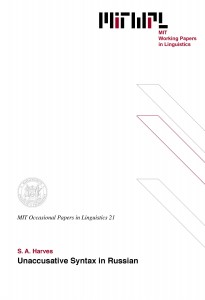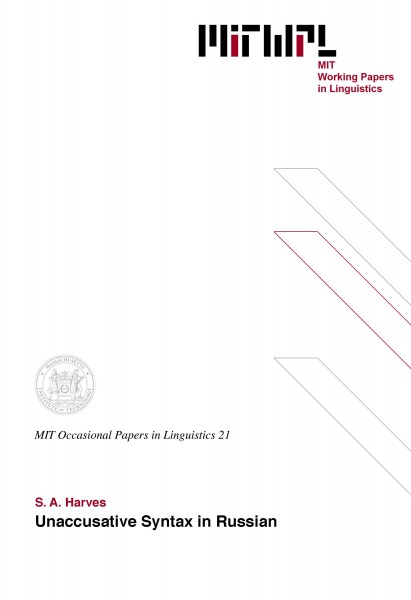MIT Occasional Papers in Linguistics #21
Unaccusative Syntax in Russian
S. A. Harves, 2003
This dissertation investigates the syntax of unaccusativity in Russian. Although unaccusativity is typically understood to be a property holding solely of intransitive predicates that select a single internal argument, this study suggests that the notion of unaccusativity needs to be broadened. It is shown that certain syntactic properties of unaccusativity in Russian apply not only to intransitive predicates but to various transitive and copular predicates as well.
One of the primary theoretical claims in this dissertation is that the canonical syntactic properties associated with unaccusativity are not reflexes of a predicate's taking a single internal argument. Rather, they follow from the featural make-up of functional and lexical heads at the Strong/Weak Phase level (Chomsky 2000, 2001). Thus, "unaccusative syntax" results whenever features of a predicate render it in some way defective. This study argues that the notions "defective" and "&Phi-incomplete" should be treated as independent properties of lexical predicates. Evidence from Russian indicates that transitive predicates may be simultaneously &Phi-complete (selecting an external argument) and defective, and therefore incapable of valuing accusative Case, while unaccusative predicates may be f-incomplete and non-defective, valuing accusative Case on internal arguments (cf. Burzio's Generalization).
Data from Russian copular sentences suggest that post-copular (i.e., non-verbal) predicates should be divided into defective and non-defective predicates as well. Under the analysis presented here, defective copular predicates are predicted to exhibit unaccusative properties, a prediction that is borne out.
An important finding of this study is that only unaccusative predicates in Russian occur with impersonal, i.e., non-agreeing, verbal morphology. Therefore, a new syntactic diagnostic for unaccusativity in Russian is proposed, i.e., the ability of a predicate to occur with impersonal morphology. The theoretical generalization that follows is that defective T(ense)0 is only possible in the presence of defective v0 in Russian. Furthermore, it is suggested that impersonal agreement is in fact not a type of default agreement, but rather, appears as the morphological manifestation of feature-matching via AGREE between two &Phi-incomplete heads. This dissertation thus makes both empirical and theoretical contributions to investigations of unaccusativity, Case, and agreement in the areas of Slavic and Theoretical Linguistics.

